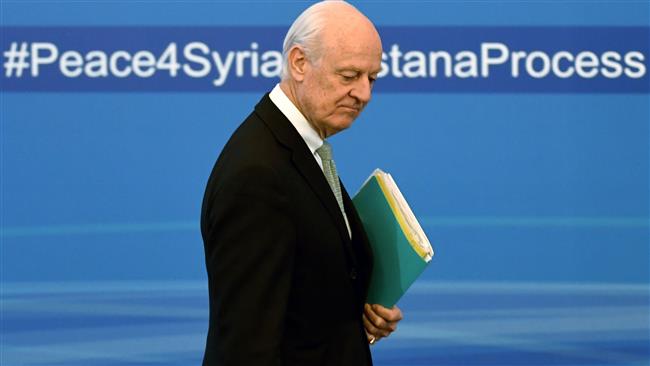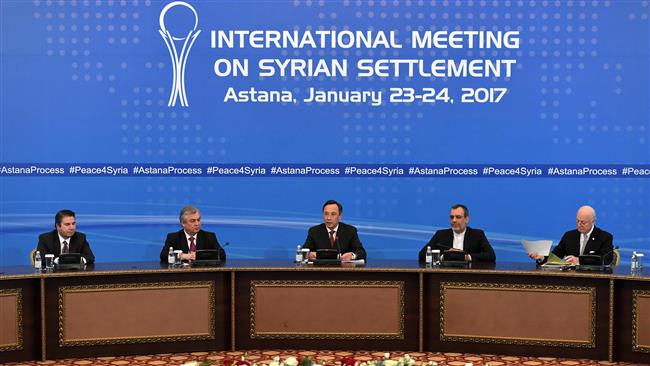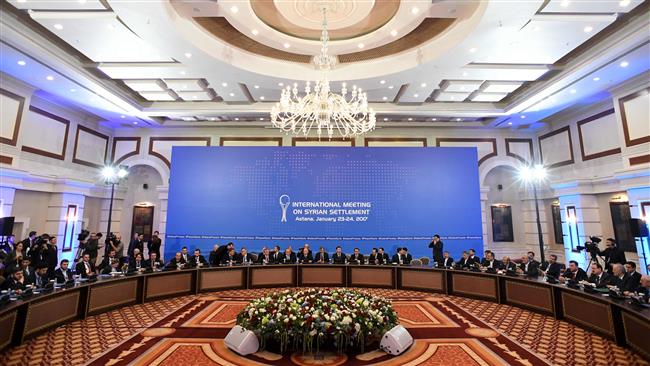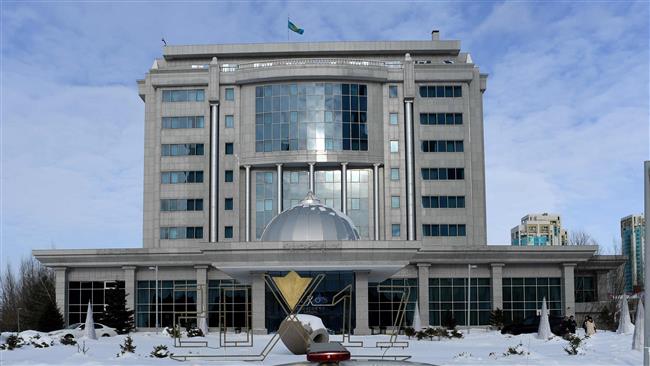‘Astana talks consolidated Syria truce’
A fresh round of Syria peace talks has wrapped up in Kazakhstan's capital Astana, with Iran, Russia and Turkey agreeing on the establishment of a trilateral mechanism to support the ceasefire in the country and monitor possible violations. Meanwhile, UN-brokered talks will be held in the Swiss city of Geneva in February to further the Syria peace process. Press TV has spoken to Peter Ford, former UK ambassador to Syria, as well as Michael Lane, founder of American Institute for Foreign Policy, to discuss the results of the Astana negotiations.
Peter Ford evaluated the Astana conference as “quite successful,” and highlighted the significance of the Syrian government achieving a consolidation of the ceasefire given that it has been fighting on too many fronts.
He also assessed as positive the direct presence of armed opposition groups in the talks for the first time instead of “the hired suits paid and bankrolled by the Saudis.”
The analyst further emphasized that the Astana talks were about managing the next phase of the conflict in Syria, rather than seeking a long-term political solution.
Therefore, he said, there will “absolutely” be more fighting but with a “refocus” on the part of the Syrian government on Daesh and al-Nusra Front (currently known as Jabhat Fateh al-Sham) terrorist groups who are its “most formidable opponents.”
The Syrian government “badly needs to keep things stable on the other fronts” so that it can go after these terrorist groups, he stated, arguing that the Free Syrian Army and other opposition groups can be dealt with later.
Elsewhere in his remarks, Ford stated that the reason why the British government has been less happy about the Astana peace process is that it would prefer to see the Syrian opposition tranquilized by its Saudi puppets.
However, he said, “this is water under the bridge and things are moving on quite rapidly”.
The former UK envoy to Syria also mentioned that Saudi rulers are under pressure from the new US President Donald Trump who is “extremely keen” on doing something about Daesh. Thus, they have to show “a bit of a happy face” but in reality they are “very bitter” about what is happening in Syria and will do whatever they can to put obstacles in the way of a political settlement.
Ford further expressed doubt that the United Nations can play a positive role in the peace talks, but agreed that it is part of the “useful fiction” that there must be a political rather than a military settlement to the conflict in Syria.
“The key participants do not really believe this but they all find it convenient for reasons of their own to pretend otherwise and in that context, the UN provides a cover for this political activity. But it is just a smokes screen and it is all just designed to get us over the next phase of the conflict,” he said in conclusion.
Meanwhile, the other panelist on the program, Michael Lane, opined that the Astana talks were undoubtedly “a success” in the sense that they will go forward in Geneva.
“It had a very limited agenda. There were no hopes for a grand solution to the issue. All they were looking to do was to solidify the ceasefire and prepare themselves to take the next step in a couple of weeks in Geneva. This, the final communique out of Astana has done beautifully,” he stated.
However, he said, the downside of it is that opposition groups have not signed onto it and they are still in control of some parts of Syria, making them still capable of causing trouble.
“But with the trilateral agreement and enforcement mechanism of the ceasefire, they (opposition groups) really cannot be effective anymore,” he noted, arguing that if they are successfully separated from the terrorist groups, then they become a “regional discontent group” that even with continued backing from Persian Gulf kingdoms - namely Saudi Arabia and Qatar - they cannot become a “viable force.”
Lane opined that President Trump’s objective is to work cooperatively with Russian President Vladimir Putin to have joint efforts against international terrorism, particularly Daesh.
He also noted that Trump is going to reverse demands by the administration of his predecessor Barrack Obama that Syrian President Bashar al-Assad step down.
“That is the price that Trump has to pay, among others, for the cooperation that he wants with Russia to achieve real cooperation in fighting terrorism,” he said, adding the United States may put pressure on its regional allies to stop funding Daesh.
However, he warned, the Saudis will still be able to fund armed opposition groups in Syria in order to cause trouble.
Lane mentioned that the reason why opposition groups have blamed Iran is that by doing so, they can garner additional sympathy to their cause.
According to Lane, the opposition groups do not want Iran to be legitimized in the whole process, but it is too late and the Islamic Republic is already one of the three equal partners in the Syria peace talks.
Top general: Enemy dares not cast hostile glance at Iran
South Korean president skips questioning for second day after arrest
IRGC captures 15 terrorists during drills in southeast Iran
Bright prospects of Iran’s energy portfolio
VIDEO | Iran and Russia's partnership agreement
VIDEO | California wildfires leave residents struggling with insurance gaps and housing shortages
Leader: Palestinian patience, resistance forced Israel to back down
VIDEO | South African, Palestinian youths use sport to boost resistance














 This makes it easy to access the Press TV website
This makes it easy to access the Press TV website